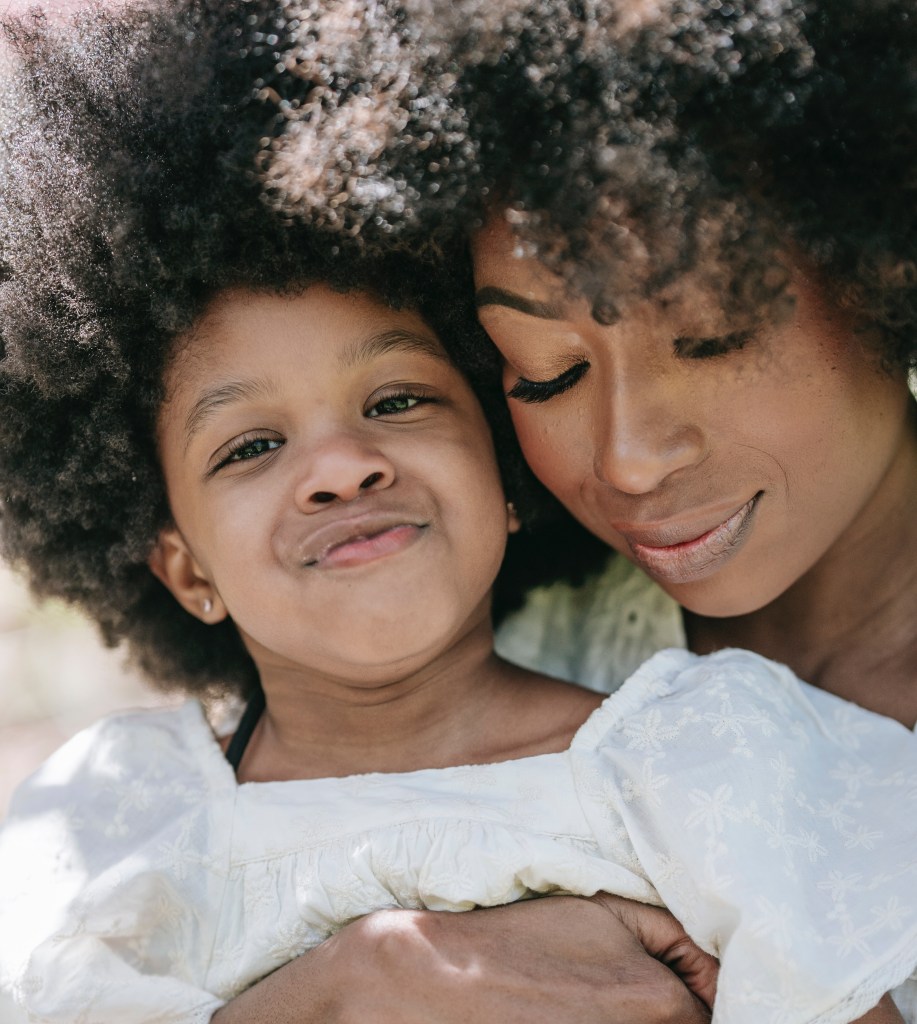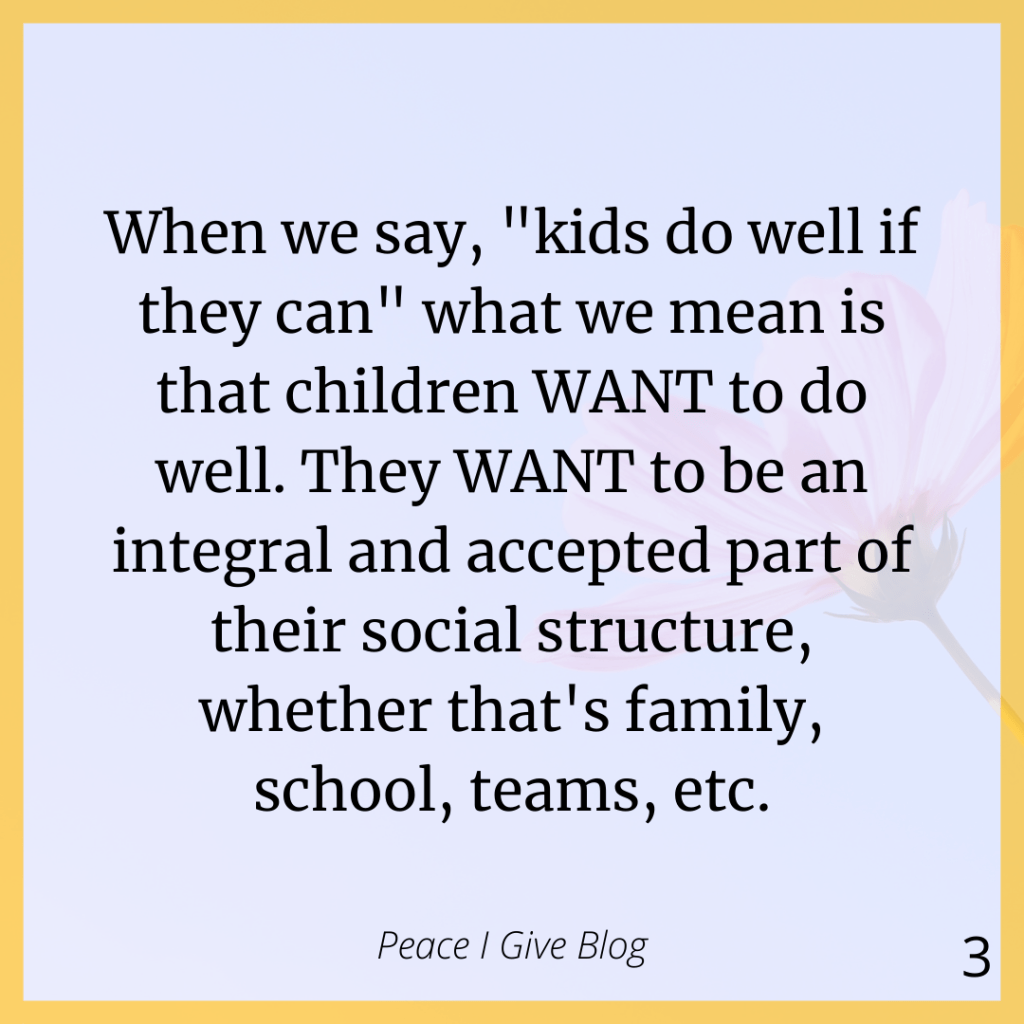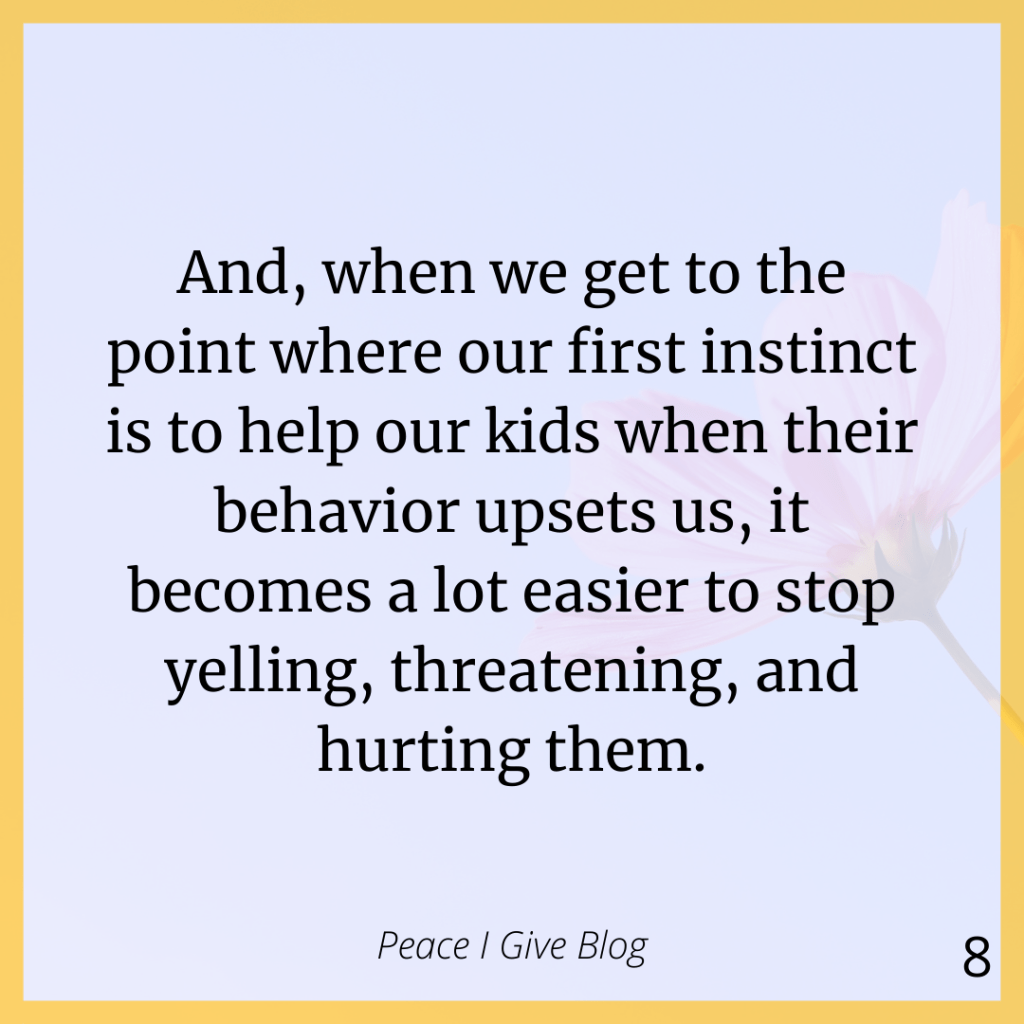
This week, I’m taking a slightly different approach. I’ve prepared a series of shareable graphics around a concept that I’ve been grappling with as my children have gotten older and their troubles are more developed than the need to nurse and have a diaper change. Truth be told, I flew into an angry outburst this past weekend and had to do a whole lot of apologizing and reconnecting.
I’m currently in physical therapy for a back injury (a large part of why I’m having difficulty maintaining my composure) and my physical therapist told me something really interesting about the body’s healing process. She said that healing is not linear. What happens is that we’ll have higher pain days and lower pain days. Over time, the higher pain days decrease and the lower pain days increase. I find that’s very similar to how I’ve experienced healing from childhood trauma. When I started out with peaceful parenting, I had a lot of angry days. I tried to avoid directing my anger at my children but I failed a lot. As time has gone by, the better days have become far more numerous. I still have emotional explosions and meltdowns, but they’re cropping up less frequently and I’m able to recover more quickly.
I think a lot of us have really rough days and we feel like we’re failing as peaceful parents, but that couldn’t be further from the truth. We are HEALING. We are doing the best we can. And, through this work, we are equipping ourselves with tools that help us see our children in a more positive light, find avenues of connection, and protect our kids from the things we experienced as children.
I hope this snapshot series will be helpful to you as you work toward a renewed mindset around becoming the parent you want to be.

Text: If you’ve had any encounters within the world of gentle, conscious parenting, you’ve probably heard the mantra, “kids do well if they can.”

Text: While the idea is ancient, Ross Greene brought modern attention to it as a key theme in his Collaborative Problem Solving model.

Text: When we say, “kids do well if they can” what we mean is that children WANT to do well. They WANT to be an integral and accepted part of their social structure, whether that’s family, school, teams, etc.

Text: In other words, when children “misbehave,” it is not because they are manipulative, devious, or bratty.

Text: Rather, children behave in a way that reflects how well their needs are being met, how connected they feel, and how adequately their brains are able to manage their particular circumstances.

Text: This mantra, “children do well if they can,” is pivotal to allowing our adult minds to shift into an anti-childist, respectful worldview around child rearing and discipline.

Text: When we recognize that, every time a child does something we don’t want them to do, it’s because they CANNOT manage otherwise on their own, we can begin thinking in terms of problem-solving with them as opposed to punishing their childlikeness.

Text: And, when we get to the point where our first instinct is to help our kids when their behavior upsets us, it becomes a lot easier to stop yelling, threatening, and hurting them.

Text: Our children will grow in wisdom over time. They will become more and more able to handle difficult circumstances with grace and self-assurance, and we can help them get there.

Text: By modeling gentleness, curiosity, and helpfulness in the face of difficulty, we can help our kids develop the tools they need to operate from a growth mindset wherein flexibility, empowerment, and hope prevail. It’s not easy, but it’s worth the effort.
I say, the best gift a child can ever receive is a healthy, properly functioning brain thus mind, hopefully for life.
This is a bit off topic, but I sometimes wonder how many instances there have been wherein immense long-term suffering by children of dysfunctional rearing might have been prevented had the parent(s) received, as high school students, some crucial child-development science education by way of mandatory curriculum? After all, dysfunctional and/or abusive parents, for example, may not have had the chance to be anything else due to their lack of such education and their own dysfunctional/abusive rearing as children. If nothing else, such curriculum could offer students an idea/clue as to whether they’re emotionally suited for the immense responsibility and strains of parenthood.
If survived, intense trauma from unhindered toxic abuse typically results in a helpless child’s brain improperly developing. If allowed to continue for a prolonged period, it can act as a starting point into a life in which the brain uncontrollably releases potentially damaging levels of inflammation-promoting stress hormones and chemicals, even in non-stressful daily routines. I consider it to be a form of non-physical-impact brain damage.
The lasting emotional and/or psychological pain from such trauma is very formidable yet invisibly confined to inside one’s head. It’s like a discomforting anticipation of ‘the other shoe dropping’ and simultaneously being scared of how badly one will deal with the upsetting event, which usually never transpires. It is solitarily suffered, unlike an openly visible physical disability or condition, which tends to elicit sympathy/empathy from others. It can make every day a mental ordeal, unless the turmoil is treated with some form of medicating, either prescribed or illicit.
The health of all children — and not just what other parents’ children might or will cost us as future criminals or costly cases of government care, etcetera — needs to be of real importance to us all, regardless of how well our own developing children are doing. A mentally sound future should be every child’s fundamental right — along with air, water, food and shelter — especially considering the very troubled world into which they never asked to enter.
____
“It has been said that if child abuse and neglect were to disappear today, the Diagnostic and Statistical Manual would shrink to the size of a pamphlet in two generations, and the prisons would empty. Or, as Bernie Siegel, MD, puts it, quite simply, after half a century of practicing medicine, ‘I have become convinced that our number-one public health problem is our childhood’.” (Childhood Disrupted, pg.228)
LikeLike
It would be extraordinary if children could be taught child development basics plus restorative conflict resolution and mental health self-care!
LikeLiked by 1 person
Yes, but we can be a stubborn species, us humans, especially when told how to rear our own young ones. … When I asked a BC Teachers’ Federation official over the phone whether there is any childrearing or child-development science curriculum taught in any of B.C.’s school districts, he immediately replied there is not. When I asked the reason for its absence and whether it may be due to the subject matter being too controversial, he replied with a simple “Yes”.
This strongly suggests there are philosophical thus political obstacles to teaching students child development/rearing science. To me, it’s difficult to imagine that teaching parenting curriculum would be considered more controversial than teaching students Sexual Orientation and Gender Identity (SOGI) curriculum, beginning in Kindergarten, as is currently taught in B.C. public schools. Meanwhile, people procreate regardless of their (in)capacity to raise children in a mentally healthy/functional manner.
If society is to avoid the most dreaded, invasive and reactive means of intervention — that of governmental forced removal of children from dysfunctional/abusive home environments — maybe we then should be willing to try an unconventional proactive means of preventing some future dysfunctional/abusive family situations. Being free nations, society cannot prevent anyone from bearing children; society can, however, educate all young people for the most important job ever, even those high-schoolers who plan to always remain childless. … Mindlessly minding our own business on this matter has long proven so humanly devastating.
LikeLike
This came to me at much needed and perfect time. I am grateful that other parents identify with this style of parenting and identify the continuing need to practice these concepts. Thank you😌
LikeLike
I’m so glad you’re here!
LikeLike